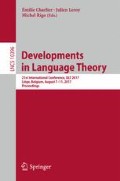Abstract
Cellular automata are a parallel model of computation. This paper presents studies about the impact of the choice of the neighborhood on small complexity classes, mainly the real time class. The main result states that given two neighborhoods \(\mathcal {N}\) and \(\mathcal {N}'\), if \(\mathcal {N}\) has a limiting vertex in some direction and \(\mathcal {N}'\) have no vertex in that direction then there is a language recognizable in real time with \(\mathcal {N}'\) and not with \(\mathcal {N}\). One easy corollary is that real time classes for two neighborhoods may be incomparable (and such neighborhoods are easy to construct).
Access this chapter
Tax calculation will be finalised at checkout
Purchases are for personal use only
References
Choffrut, C., Culik II, K.: On real-time cellular automata and trellis automata. Acta Inf. 21, 393–407 (1984). http://dx.doi.org/10.1007/BF00264617
Delacourt, M., Poupet, V.: Real time language recognition on 2D cellular automata: dealing with non-convex neighborhoods. In: Kučera, L., Kučera, A. (eds.) MFCS 2007. LNCS, vol. 4708, pp. 298–309. Springer, Heidelberg (2007). doi:10.1007/978-3-540-74456-6_28
Grandjean, A.: Constant acceleration theorem for extended von neumann neighbourhoods. In: Cook, M., Neary, T. (eds.) AUTOMATA 2016. LNCS, vol. 9664, pp. 149–158. Springer, Cham (2016). doi:10.1007/978-3-319-39300-1_12
Kutrib, M., Malcher, A.: Transductions computed by iterative arrays. Journees Automates Cellulaires 2010, 156–167 (2010)
von Neumann, J.: Theory of Self-reproducing Automata. University of Illinois Press, Urbana (1966)
Poupet, V.: Cellular automata: real-time equivalence between one-dimensional neighborhoods. In: Proceedings of STACS 2005, pp. 133–144 (2005)
Smith III, A.R.: Simple computation-universal cellular spaces. J. ACM 18(3), 339–353 (1971)
Terrier, V.: Two-dimensional cellular automata recognizer. Theor. Comput. Sci. 218, 325–346 (1999)
Terrier, V.: Two-dimensional cellular automata and their neighborhoods. Theor. Comput. Sci. 312, 203–222 (2004)
Author information
Authors and Affiliations
Corresponding author
Editor information
Editors and Affiliations
Rights and permissions
Copyright information
© 2017 Springer International Publishing AG
About this paper
Cite this paper
Grandjean, A. (2017). Differences Between 2D Neighborhoods According to Real Time Computation. In: Charlier, É., Leroy, J., Rigo, M. (eds) Developments in Language Theory. DLT 2017. Lecture Notes in Computer Science(), vol 10396. Springer, Cham. https://doi.org/10.1007/978-3-319-62809-7_14
Download citation
DOI: https://doi.org/10.1007/978-3-319-62809-7_14
Published:
Publisher Name: Springer, Cham
Print ISBN: 978-3-319-62808-0
Online ISBN: 978-3-319-62809-7
eBook Packages: Computer ScienceComputer Science (R0)

